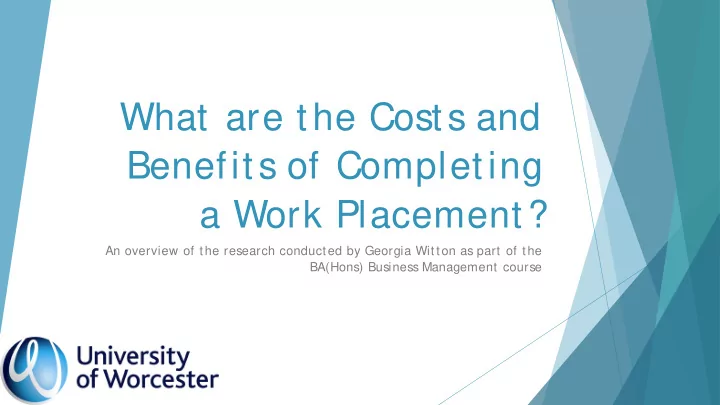

What are the Costs and Benefits of Completing a Work Placement? An overview of the research conducted by Georgia Witton as part of the BA(Hons) Business Management course
My name is Holly Andrews, and I am a placement coordinator
Context Placements were first introduced at the end of the 19 th century Placement provision re-emerged as a significant issue in 1997 following the publication of the Dearing report A clear body of research indicates that placements support improved skills, employability, and attaining a higher degree classification Despite the researched benefits the number of students choosing to participate in a placement year has fallen “ Why should I complete a work placement? ” (Prospects, 2015) From an organisational viewpoint, High Fliers Annual Report for Employers (2014) found that a record 37% of recruiters’ entry-level positions were expected to be filled by graduates who had already worked for the organisation
Key Research
Business Management and Engineering S tudents No studies attempt to compare subj ect courses Particularly significant considering the relative outlook: In 2013 3,800 students graduated with a degree in Mechanical Engineering compared to 20,135 Business and Management students (HECS U, 2014) S TEM skills considered to underpin the UK’s ability to compete and grow in a range of industries 43% of employers currently have difficulty recruiting full-time staff with S TEM degrees, expected to rise to 53% in three years (CBI, 2011) Will students from Engineering disciplines view placements as positively as Business Management students?
Research Question Do the reported costs and benefits of completing a work placement differ between Business Management and Engineering students? Obj ectives To explore the students’ perceptions of the benefits of undertaking a work 1. placement in regards to skills developed, transition back to university and graduate employability Understand the perceived costs, if any, of undertaking a placement 2. Compare the experiences of Engineering and Business Management students 3.
Method 12 participants were selected using self-selection sampling S emi-structured interviews conducted in March 2015 Interviews transcribed in full and thematic content analysis used Themes based on research by Little and Harvey (2007) and Auburn model (1993)
Participant Information
Findings
Theme I: S kills Development Findings corroborates Little and Harvey’s (2007) results, skill development remains an important factor for students learning over placement. Time Management was the most cited skill by students S tudents referred to the ability to integrate theory and practise Interpersonal skills were cited by almost all Engineering students and not Business Management students
Theme II: Employability Employment opportunities as a result of undertaking a placement were cited more frequently by Business Management students Two of the Business Management participants (BMP’s) stated that their placement had allowed them to gain relevant part time employment in their final year Two BMP’s stated that they had graduate j obs as a result of their placement Fewer Engineering participants (EP’s) mentioned graduate opportunities though two acknowledged building a professional network All participants interviewed acknowledged that their placement year had enhanced their CV
Theme III: Improved S elf Awareness The study broadened the original A Priori theme of “ Improved self awareness” to include: improved self awareness of skills and capabilit ies and insight int o desired j ob role S kills and capabilities insight was mentioned by three BMP’s Almost all participants in the study described how their placement had allowed greater insight into their desired career
Theme IV: Experience Transitioning Back to University Financial difficult y when ret urning t o universit y was mainly det ermined by t he t ype of organisat ion t he st udent had worked for on placement Change of cohort was cit ed as a difficult y bot h for t he st udent s socially and academically when t hey were unfamiliar wit h new colleagues wit h whom t hey were required t o work wit h in group work Engineering st udent s generally looked upon a year out favourably compared t o BMP’s BMP’s acknowledged difficult ies when t ransit ioning back t o universit y and complet ing academic writ t en work S t udent s were mixed in t heir opinions t owards whet her t hey were more or less mot ivat ed t o st udy upon t heir ret urn t o universit y
Conclusion “If you wanted a conclusion, it’s that if anyone was thinking of doing a placement I would recommend it, no matter what course you’re doing.” Engineering Participant 6 Research supports the consensus that work placements are beneficial in the eyes of those who complete them Engineering students in particular mentioned interpersonal skills as a benefit Business Management students included improved self awareness and employment opportunities as incentives to completing a placement There were some negative responses attached to students’ transition back to university
Implementation in WBS
Coaching
Academic S upport Proj ect support Enhanced induction
Paid Placements
International Placements
Outcomes S tudent S atisfaction Placement Outcomes Last year 50% As of end of March last students satisfied with placements year 16 students had preparation secured placements. This year 98% This year as of end of students satisfied with placements March 22 students had preparation secured placements. 37.5% increase in placement numbers
S uggestions for future research Research examining the reasons cited by students who do not complete a placement for not doing so Comparing the perceptions of placement students from other degree areas, for example S cience, the third largest contributor to placement students, and degree subj ects with significantly lower participation rates Completing the research with a cohort of students who commenced their university studies post 2012, subj ect to higher tuition fees
Thank you for listening are there any questions?
Recommend
More recommend